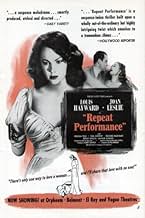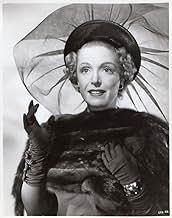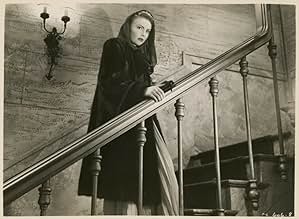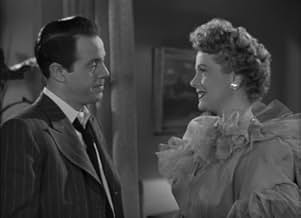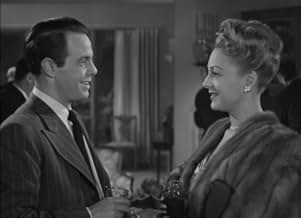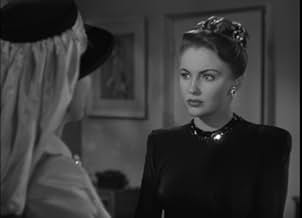CALIFICACIÓN DE IMDb
6.8/10
2.3 k
TU CALIFICACIÓN
En la víspera de Año Nuevo de 1946, Sheila Page mata a su esposo Barney.En la víspera de Año Nuevo de 1946, Sheila Page mata a su esposo Barney.En la víspera de Año Nuevo de 1946, Sheila Page mata a su esposo Barney.
- Dirección
- Guionistas
- Elenco
Ilka Grüning
- Mattie
- (as Ilka Gruning)
John Alban
- Party Guest
- (sin créditos)
Keefe Brasselle
- Delivery Boy
- (sin créditos)
Ralph Brooks
- New Year's Eve Reveler
- (sin créditos)
Jean Del Val
- Tony
- (sin créditos)
Abe Dinovitch
- Peanut Vendor
- (sin créditos)
John Dutriz
- Ricardo
- (sin créditos)
Dick Gordon
- Party Guest
- (sin créditos)
Alf Haugan
- Attendant
- (sin créditos)
Leyland Hodgson
- Ship Steward
- (sin créditos)
Patrick Hurst
- Virgil
- (sin créditos)
- Dirección
- Guionistas
- Todo el elenco y el equipo
- Producción, taquilla y más en IMDbPro
Opiniones destacadas
Terrific soap opera with a twist. A beautiful actress kills her cheating, alcoholic husband on New Year's Eve, but soon finds she's getting the chance to relive the past year of her life all over again! Who among us wouldn't want a chance like this? Fantasy elements in the story are surprisingly subtle, as we realize along with Joan Leslie that some paths can be walked twice, but the outcome is difficult to change. Leslie, who looks like a young Esther Williams, gives a very good performance, aided by some taut dialogue. Neat little item, with plenty of backstage witticisms and show-people with no morals. *** from ****
Interesting noir that issues from an imaginative premise-- suppose we had a year that we could live all over again. So who wouldn't want that opportunity. Naturally, we could change our own actions to better optimize outcomes, but what about others-- would their actions have to change too.
The premise may even require the entire world to live that same year over so as to fit into the changes that ripple out from our own changes. Conceptual questions aside, the premise is simplified here into a rather clever soap-operish plot— namely, can sympathetic Sheila (Leslie) avoid killing her louse husband (Hayward) a second time around. That is, can she maybe just ignore his many provocations, given a second chance.
Instead of playing up occult aspects, the screenplay concentrates on revolving relationships among sophisticated show-business types. It's a good cast, especially an agreeably addled Richard Basehart. However, I'm not sure the sweetly gentle Leslie has the gravitas for a difficult role, especially for the wronged woman part. Still, she certainly wins our sympathy. Director Werker films in noirish style lending the visuals a suitably twilight quality. The ending too is appropriate, without obvious cheating on the premise.
The movie seems more obscure than deserved and I'm not sure why. It certainly made an impression on me on first viewing many years ago. I suspect the obscurity is because of a B- movie cast-- no matter how accomplished—and a non-studio pedigree. But whatever the reason, the film remains a thought provoking 90-minutes even this many years after.
The premise may even require the entire world to live that same year over so as to fit into the changes that ripple out from our own changes. Conceptual questions aside, the premise is simplified here into a rather clever soap-operish plot— namely, can sympathetic Sheila (Leslie) avoid killing her louse husband (Hayward) a second time around. That is, can she maybe just ignore his many provocations, given a second chance.
Instead of playing up occult aspects, the screenplay concentrates on revolving relationships among sophisticated show-business types. It's a good cast, especially an agreeably addled Richard Basehart. However, I'm not sure the sweetly gentle Leslie has the gravitas for a difficult role, especially for the wronged woman part. Still, she certainly wins our sympathy. Director Werker films in noirish style lending the visuals a suitably twilight quality. The ending too is appropriate, without obvious cheating on the premise.
The movie seems more obscure than deserved and I'm not sure why. It certainly made an impression on me on first viewing many years ago. I suspect the obscurity is because of a B- movie cast-- no matter how accomplished—and a non-studio pedigree. But whatever the reason, the film remains a thought provoking 90-minutes even this many years after.
the problem is, i cant locate a copy of this movie. i have looked for literally years, ever since vcrs became popular, and it is nowhere to be found. for some reason i remember the plot of a woman getting to relive the past year with incredible fondness. it was indeed a delightful movie, and i would so much love to see it again.
Repeat Performance needs urgent rescuing from the black hole it has somehow fallen into. A superior Poverty Row production from Eagle-Lion Studios, it's imaginatively scripted, played with gusto and never less than fascinating a curio, film noir in a sci-fi time loop.
On New Year's Eve, 1947, Joan Leslie shoots and kills her husband, Louis Hayward. She wishes she hadn't, and her wish comes true suddenly she's back in New Year's Eve, 1946. This proves to be no mere shuffling around of the narrative; she's been given the year to live over again in hopes of a happier ending. But of course the gimmick serves as a flashback, too, retracing the sequence of events that led (or will lead?) up to the shooting.
The title also drops a clue about the picture's fang-and-claw milieu, New York's theater world. Leslie's a star on the Rialto, having come to prominence in one of her husband's plays. He turned out to be a one-shot wonder, however, resorting to the bottle in resentment of his failure and his wife's success (there are parallels to A Star Is Born and to All About Eve). Other characters in this backstage story include Leslie's producer, Tom Conway; Virginia Field, as a haughty English playwright; Richard Basehart (looking, in his debut, like a young Harrison Ford), as an unhappy poet but loyal friend; and Natalie Schafer, as a viperish patroness of the arts.
When Leslie suddenly finds herself in last year's gown, she tries to renegotiate her way through the year, this time in possession of an advance copy of the script, gingerly avoiding its fatal pitfalls. She comes to learn (as do we all) that destiny writes in cement. Luckily for her, it hasn't quite hardened.
On the first New Year's Eve, Howard's resolution not to drink doesn't even make it to midnight; he turns sullen and abusive. A spring sojourn to sunny California, while shopping for a new vehicle for Leslie, doesn't improve his moods. Her next prospect comes from the pen of Field, and Howard browbeats her into accepting it; he, meanwhile, takes up with its author. Basehart finds himself in the clutches of Schafer, who ends up having him committed to an asylum, while Howard suffers a drunken fall that paralyzes him. As the year winds to its close, Leslie desperately tries to extricate herself from what she knows is to come....
Despite being an unlikely hodge-podge of noirish, soapish and paranormal elements, the movie never seems stretched or thrown together. The less than luminous cast rises to the occasion, with each member allotted a place in the spotlight. Accept the flaw in the warp or weft of the fabric of time, and Repeat Performance zips along smoothly and convincingly. It's buried treasure proof, albeit obscure, that rough magic could sometimes occur even on the outer fringes of the movie industry.
On New Year's Eve, 1947, Joan Leslie shoots and kills her husband, Louis Hayward. She wishes she hadn't, and her wish comes true suddenly she's back in New Year's Eve, 1946. This proves to be no mere shuffling around of the narrative; she's been given the year to live over again in hopes of a happier ending. But of course the gimmick serves as a flashback, too, retracing the sequence of events that led (or will lead?) up to the shooting.
The title also drops a clue about the picture's fang-and-claw milieu, New York's theater world. Leslie's a star on the Rialto, having come to prominence in one of her husband's plays. He turned out to be a one-shot wonder, however, resorting to the bottle in resentment of his failure and his wife's success (there are parallels to A Star Is Born and to All About Eve). Other characters in this backstage story include Leslie's producer, Tom Conway; Virginia Field, as a haughty English playwright; Richard Basehart (looking, in his debut, like a young Harrison Ford), as an unhappy poet but loyal friend; and Natalie Schafer, as a viperish patroness of the arts.
When Leslie suddenly finds herself in last year's gown, she tries to renegotiate her way through the year, this time in possession of an advance copy of the script, gingerly avoiding its fatal pitfalls. She comes to learn (as do we all) that destiny writes in cement. Luckily for her, it hasn't quite hardened.
On the first New Year's Eve, Howard's resolution not to drink doesn't even make it to midnight; he turns sullen and abusive. A spring sojourn to sunny California, while shopping for a new vehicle for Leslie, doesn't improve his moods. Her next prospect comes from the pen of Field, and Howard browbeats her into accepting it; he, meanwhile, takes up with its author. Basehart finds himself in the clutches of Schafer, who ends up having him committed to an asylum, while Howard suffers a drunken fall that paralyzes him. As the year winds to its close, Leslie desperately tries to extricate herself from what she knows is to come....
Despite being an unlikely hodge-podge of noirish, soapish and paranormal elements, the movie never seems stretched or thrown together. The less than luminous cast rises to the occasion, with each member allotted a place in the spotlight. Accept the flaw in the warp or weft of the fabric of time, and Repeat Performance zips along smoothly and convincingly. It's buried treasure proof, albeit obscure, that rough magic could sometimes occur even on the outer fringes of the movie industry.
I was given a copy of this film on 16mm and watched it with great curiosity for years without really knowing what it was. Why it has not been put onto DVD I don't know, but hope that it will soon. The premise of a woman wishing she had a year to live over again is not new, but is given a poignant treatment here, and is quite believable. Richard Basehart as a poet is really a fine performance, even an heroic one. Top it off, the music is written by George (Ballet Mecanique) Antheil, an idol of mine that I had no idea had scored this film--and it is quite a nice score at that, with a pounding climax that must have had everyone on the edge of their seat.
¿Sabías que…?
- TriviaAccording to Eddie Muller, the producers thought so highly of Richard Basehart's performance in the film that they held its world premiere in Basehart's home town, Zanesville, Ohio.
- ErroresSheila tells William she shot her husband "with this" and hands him a semi-automatic pistol. He says, "In your right hand a smoking revolver." A semi-automatic pistol is not a revolver.
- Citas
Barney Page: Yes, Sheila, California's a wonderful place - IF you're a grapefruit.
- ConexionesFeatured in Noir Alley: Repeat Performance (2019)
- Bandas sonorasMalbrough s'en va-t-en guerre
(uncredited)
Artist unknown
[5m]
Selecciones populares
Inicia sesión para calificar y agrega a la lista de videos para obtener recomendaciones personalizadas
- How long is Repeat Performance?Con tecnología de Alexa
Detalles
- Fecha de lanzamiento
- País de origen
- Sitio oficial
- Idioma
- También se conoce como
- Repeat Performance
- Locaciones de filmación
- Productora
- Ver más créditos de la compañía en IMDbPro
Taquilla
- Presupuesto
- USD 1,300,000 (estimado)
- Tiempo de ejecución1 hora 31 minutos
- Color
- Relación de aspecto
- 1.37 : 1
Contribuir a esta página
Sugiere una edición o agrega el contenido que falta

Principales brechas de datos
What is the Spanish language plot outline for El destino se repite (1947)?
Responda
